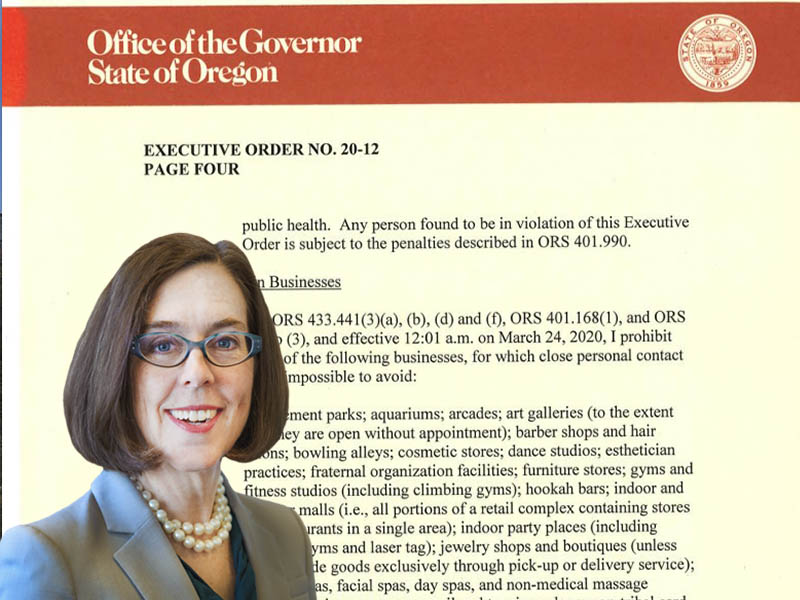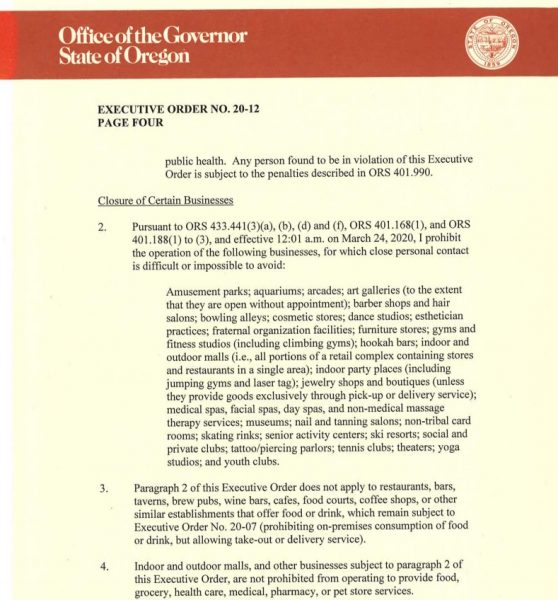Oregon Governor Kate Brown issued an executive order Monday, tightening restrictions on commerce and ordering Oregonians to stay home to the “maximum extent possible.”
Those who fail to comply with the order will be considered an immediate danger to public health and subject to a Class C misdemeanor.
“I started by asking Oregonians to stay home and practice social distancing. Then I urged
the public to follow these recommendations,” Governor Brown said. “Instead, thousands crowded the beaches of our coastal communities, our trails, our parks, and our city streets, potentially spreading COVID-19 and endangering the lives of others across the state. Now, I’m ordering it. To save lives and protect our community.”
Executive Order 20-12 is effective immediately, and remains in effect until ended by the Governor.
“This order is designed to flatten the curve over the coming weeks, preserving scarce hospital space and equipment. It will also ensure that any place of business that remains operational does its part to enforce social distancing rules,” said Governor Brown. “It is designed to be more sustainable over time, to allow Oregonians to keep their jobs when their work does not add to the growth of COVID-19 in Oregon.”
About the order:
- All non-essential social and recreational gatherings of individuals are prohibited immediately, regardless of size, if a distance of at least six feet between individuals cannot be maintained. Gatherings of members of the same residential household are permitted.
- It closes and prohibits shopping at specific categories of retail businesses, for which close personal contact is difficult to avoid, such as arcades, barber shops, hair salons, gyms and fitness studios, skating rinks, theaters, and yoga studios.
- It requires businesses not closed by the order to implement social distancing policies in order to remain open, and requires workplaces to implement teleworking and work-at-home options when possible.
- It directs Oregonians to stay home whenever possible, while permitting activities outside the home when social distance is maintained.
- It closes playgrounds, sports courts, and skate parks, among other types of outdoor recreation facilities. Those that remain open are required to strictly adhere to social distancing guidelines.
- It outlines new guidelines for child care facilities, setting limits and rules on amounts of children allowed in care, and outlining that child care groups may not change participants.
Retail businesses closed by the order include:
- Shopping: Outdoor and indoor malls and retail complexes, although individual types of businesses not subject to the measures may stay open.
- Fitness: Gyms, sports and fitness centers, health clubs, and exercise studios.
- Grooming: Barbershops, beauty and nail salons, and non-medical wellness spas.
- Entertainment: Theaters, amusement parks, arcades, bowling alleys, and pool halls.
Other retail businesses will not be able to continue to operate unless they can implement strict social distancing measures and designate an employee or officer charged with ensuring compliance. Retail businesses able to adapt to take-out style shopping experiences can also remain open. If businesses can have employees work from home, then they must do so. Many of the businesses outlined in the order have voluntarily closed their doors already, to do their part to protect Oregon’s communities. In addition, non-retail businesses like manufacturers and the construction industry must ensure that their employees are maintaining social distancing measures.
The full list of businesses includes:
The order states Oregon Health Authority has the authority to determine if additional business closures are necessary to slow the spread of COVID-19, subject to approval of the Governor.
Individuals are directed to minimize travel, other than essential travel to or from home or work, to obtain food, essential consumer needs, education, health care, emergency services, essential business and government services; to care for family members, household members, the elderly, minors dependants, persons with disabilities, or other vulnerable persons, pets or livestock.








Now to order the tourists out. Has anything been done with that situation yet? We as locals are ordered what not to flush down our toilets, yet I have a feeling that we are not the ones actually doing it. Out of towners probably just don’t care.